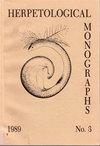Paleoclimatology, Paleogeography, and the Evolution and Distribution of Sea Kraits (Serpentes; Elapidae; Laticauda)
IF 1
2区 生物学
Q3 ZOOLOGY
引用次数: 17
Abstract
Abstract: The geographic range of sea kraits encompasses one of the geologically most-complex regions of the world. At its center lies Wallacea (the transition between the terrestrial biotas of the Asian and Australian tectonic plates) and the Indonesian Throughflow (nexus of the equatorial marine biotas of the Indian and Pacific oceans). The aim of this study was to elucidate the role of paleogeography, paleoclimatology, and oceanic currents in the evolution and distribution of sea kraits across these major biogeographic crossroads and beyond. A recent assessment of times of taxonomic divergence was projected against paleogeographic reconstructions to produce a parsimonious, hypothetical model of events critical for the origin, dispersal, and differentiation of this taxon. Times and degree of divergence of taxa suggested by recent morphological and molecular studies are in accord with various climatological and geologic events. The model postulates that the distribution of sea kraits was neither greatly affected by tectonics, other than the approach of the Australian Plate to the Asian one, nor dominated by the historic barriers to dispersal of terrestrial fauna across Wallacea, or by the Indonesian Throughflow. Rather, the model suggests that two major factors—paleogeographic alteration of the configuration of land and sea, and the directions of sea currents, past and present—provide an explanation of how these amphibious snakes (1) originated from a terrestrial Asian elapid ancestor, (2) subsequently generated the venomous Australian land snakes and their derivatives the true sea snakes, and (3) differentiated into the species complexes, species, and infraspecific entities of the genus Laticauda.古气候学、古地理与海蛇的演化与分布
摘要:海克拉的地理范围涵盖了世界上地质最复杂的地区之一。其中心是Wallacea(亚洲和澳大利亚构造板块陆地生物群之间的过渡)和印度尼西亚Throughflow(印度洋和太平洋赤道海洋生物群的连接点)。这项研究的目的是阐明古地理、古气候学和洋流在这些主要生物地理十字路口及其他地区海克拉的进化和分布中的作用。根据古地理重建,预测了最近对分类分歧时间的评估,以产生一个对该分类单元的起源、扩散和分化至关重要的简约假设事件模型。最近的形态学和分子研究表明,分类群的分化时间和程度与各种气候和地质事件一致。该模型假设,除了澳大利亚板块接近亚洲板块外,海克拉的分布既没有受到构造的极大影响,也没有受到陆生动物在瓦拉西亚传播的历史障碍或印度尼西亚贯流的支配。相反,该模型表明,两个主要因素——陆地和海洋形态的古地理变化,以及过去和现在洋流的方向——为这些两栖蛇提供了解释:(1)起源于亚洲陆生elapid祖先,(2)随后产生了有毒的澳大利亚陆地蛇及其衍生物——真正的海蛇,(3)分化为Laticoda属的种复合体、种和种下实体。
本文章由计算机程序翻译,如有差异,请以英文原文为准。
求助全文
约1分钟内获得全文
求助全文
来源期刊

Herpetological Monographs
生物-动物学
CiteScore
5.40
自引率
0.00%
发文量
2
审稿时长
>12 weeks
期刊介绍:
Since 1982, Herpetological Monographs has been dedicated to original research about the biology, diversity, systematics and evolution of amphibians and reptiles. Herpetological Monographs is published annually as a supplement to Herpetologica and contains long research papers, manuscripts and special symposia that synthesize the latest scientific discoveries.
 求助内容:
求助内容: 应助结果提醒方式:
应助结果提醒方式:


